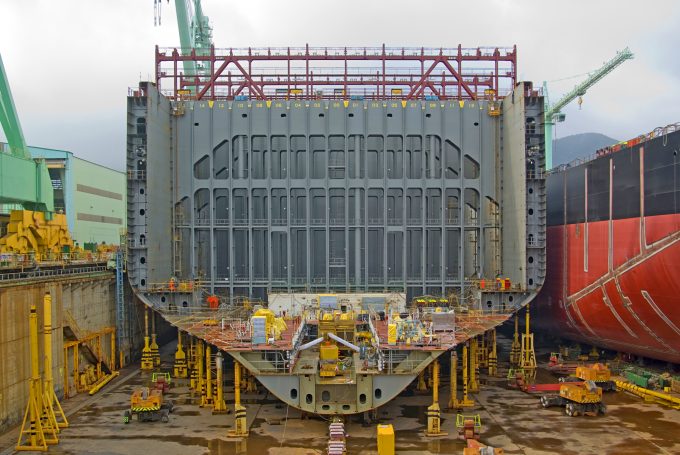HMM leads as South Korea embarks on state-backed box fleet expansion
HMM said today it would increase its box ship fleet to 130, with a combined ...

A depressing picture of the global ship building industry was painted by executives at an international summit of major shipyards in South Korea this week.
The home nation’s top three – Hyundai Heavy Industries Co (HHI), Daewoo Shipbuilding & Marine Engineering Co (DSME) and Samsung Heavy Industries Co (SHI) – collectively lost Won8.5tn ($7.5bn) in 2015 and are ramping up cost-cutting efforts as new orders fall well short of targets.
And the country is bracing for mass redundancies and lay-offs in its shipbuilding sector as part of the tough restructuring at the yards.
At the 25th JECKU (Japan, Europe, China, South Korea and the US) meeting of international shipyard executives in Gyeongji, delegates were told that orders between January and September this year were less than a third of the recent five-year average, at just 8.66m gross tonnes.
Delivering the keynote speech, SHI chief executive Park Dae-young said a slump in the global economy had had a “negative impact on the shipbuilding sector” and stubbornly low oil prices had stymied demand for offshore facilities.
But it was the overcapacity of tonnage in most shipping sectors that was the biggest concern for delegates.
Shigeru Murayama, president of Japan-based Kawasaki Heavy Industries, said: “Over the past few years, ships have been built at a faster pace than the increase in maritime trade, which has resulted in oversupply.”
The crisis afflicting the shipbuilding industry in South Korea was also the focus of much debate at the annual World Ocean Forum in Busan last week.
Speaker after speaker warned of the consequences of large scale redundancies at shipyards, which could be as high as 30,000 this year and next and impact a similar number of workers involved in supplying product to the yards.
One analyst told The Loadstar on the side lines of the conference that HHI’s current orderbook stood at $2.3bn against its 2016 budget of $13.1bn, while DSME’s orders so far of $1.3bn fell far short of its $6.2bn full-year target.
“Something’s got to give,” he said, “and it won’t be pretty.”
Delivering a speech at the Forum, Professor Tony Michell, of the Korea Development Institute and author of The One Million Jobs Initiative, called on the industry and Korean government to rethink its “narrow minded views of shipbuilding” and look at “other windows of opportunity” for sustained shipyard employment.
Prof Michell advocated targeting the cruise line industry, which is still seeing exponential growth and has the advantage of providing many more jobs than traditional cargo ship building.
And with the saturation of tonnage in the ultra-large containership sizes, it was argued that Korean shipyards should target shipowners’ requirements for vessels in the smaller vessel sectors, which have largely been overlooked in the past few years.
For example, the Gdansk shipyards in Poland had reinvented themselves by concentrating on building for niche sectors of the maritime industry, such as ocean exploration vessels, and this was as a business plan that perhaps could be replicated by the shipyards in Korea.
Comment on this article